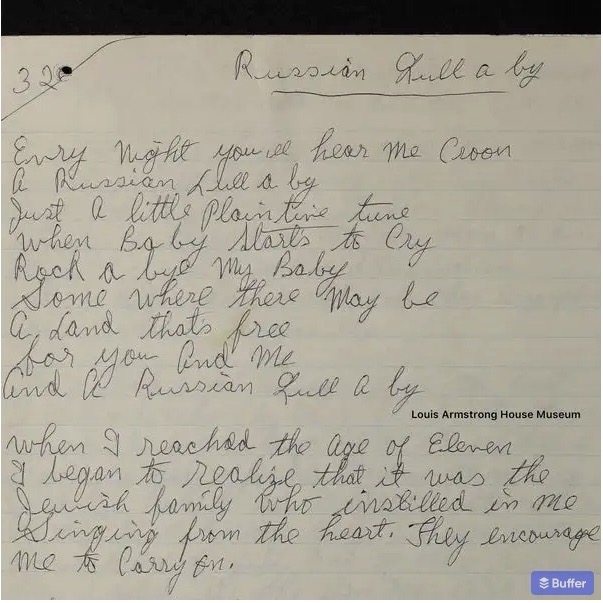written by Anne SkyvingtonDecember 30, 2022

And helped by a Jewish family he becomes a legend
I wonder how many Americans know this story about Louis Armstrong’s difficult childhood. I’d like to re-tell it here from my own perspective. For me, this is a story with spiritual or mystical implications. I am including, therefore, placing it in the “Spirit” category of my blog.
As a youngster, Louis was a street kid. He lived with his sister, mother, and grandmother in a rundown area of New Orleans known as “the Battlefield,” because of the gambling, drunkenness, fighting, and shooting that frequently occurred there.
But certain benefits and compensations came his way, as if by karma, or was it via angelic gifts?
Louis was early on drawn towards a kindly Jewish family in the poor neighborhood where he grew up. It was like providence or karma protecting him.
The Karnofskys were Jewish migrants, aliens, who had had to flee their own country, Lithuania, for reasons to do with race. Like them, Louis, who was poor and black, was an outcast in his country, too. They gave him work, took him under their wing and insisted that he eat dinners with them. Mrs Karnofsky spoke Yiddish and gave Louis the nickname of Satchmo, which stuck forever after.
“Cousin Louis” blossomed from the emotional support the Karnofskys extended to him. The best part of his day came in the evening when he and all the children would gather around Mother Karnofsky as she put the baby to sleep.

Decades later, the scene remained vivid: He wrote the words shown above near to the end, when he was dying.
“Russian Lullaby,” he wrote tenderly, “is the song that I sang when I was seven years old — when I was working for the Karnofsky family. Every night at their house, Mother Karnofsky would rock the Baby David to sleep… we all would get our places and sing it. So soft and sweet… We all sang together until the little baby dozed off. Then we bid each other good night. Then I would go home — across the tracks town to Mayann and Mama Lucy, my mother and sister.” (http://aboutlouisarmstrong.weebly.com/early-life.html)
Armstrong described the evening ritual in the Karnofsky home. Savoring these moments once again, he related how this Jewish family had opened their home and their hearts to him, and he credited them for the innovative music style that he developed.
He praised the members of the Jewish community who treated him with respect, as a fellow human being, regardless of which side of the tracks he came from. He admired the family solidarity within the Karnofsky household and described how each new child was looked on as a precious gift.
Louis had been abandoned by his father. Yet, positive karma walked forever beside him, rescuing him from the depths of misfortune. The Jewish family was only the beginning. At eleven, after being sent to an orphanage for discharging a gun that belonged to his step-father, he found himself surrounded by music. He soon became leader of the “home” band, and his future career was already shining on the horizon.
Louis learned to play the trumpet well and was soon being admired for his musical skills. But he never forgot the kindness of the Jewish people, and, wherever he turned, he made more Jewish friends. His manager and close friend, Joe Glaser, was Jewish. He presented the young Louis with the Star of David, which he would wear proudly in honor of all that the Jewish people in his life had done for him.
For years, Louis Armstrong followed a work ethic inspired by the Karnofskys. By the 1950s, he had become an American icon. He represented his country musically all around Europe, as well as in Israel and the Middle East, performing an average of two shows a day.
He had loved the way the Karnofskys supported their community with continuous hard work, mutual help and caring. The family’s love and solidarity made a deep impression on him.
“The Jewish people have such wonderful souls,” he wrote. “I always enjoyed everything they sang and still do. Of course, I sang the Lullaby Song with the family — I did not go through every song they sang. But I was a good listener. Still am.”
“I will love the Jewish people all my life,” he declared in Louis Armstrong and the Jewish Family. “They were always warm and kind to me, which was very noticeable to me — just a kid who could use a word of kindness.”
He stressed how much he had learned from them — “how to live, real life and determination.”(http://aboutlouisarmstrong.weebly.com/early-life.html)
But perhaps above all, Louis Armstrong was an advocate for a spiritual message of loving one’s fellow man. His broad, beaming smile became his signature. Rather than seek revenge for past slights, he encouraged followers to focus on the half of the cup that was full, to find pleasure and satisfaction in it, to work hard, and spread happiness and good will.

Take away: My attraction to this story is from a connection I have always felt towards Jewish people, as well as towards the famous musician, Louis Armstrong. The story raises questions in my mind. Why is it that some people become steeped in misery and darkness, after suffering negative childhood events; while others, like Louis Armstrong, overcome past difficulties in a seemingly miraculous way? It is as if “Spirit” has silently accompanied the suffering person throughout their whole life. Ups and downs become part of the whole story. Compensating factors, Louis’ Jewish friends, and his musical blessings, balance out the negatives, and a positive outlook replaces the potential darkness. It’s also a “rags to riches” story from a broadly spiritual perspective.
What connections existed for Louis and his Jewish protectors?What were the spiritual aspects to Louis’ story for the author?Where does the nickname ‘Satchmo’ come from?Who is the famous musician?Why is the author drawn to this story?

